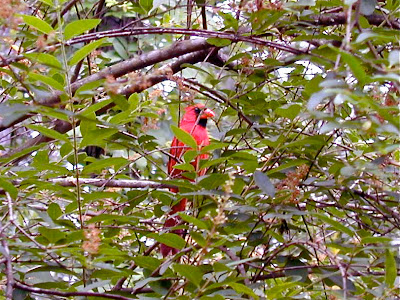Nowadays, we live in the Information Age. Satellite dishes and cable TV take us to remote corner of the earth and to outer space. Spending an hour surfing the Net can yeild more information than is possible to find in days of research in a library.
Amid this deluge of knowledge, it's easy to forget the childhood wonder of discovery we had when we were young and just beginning the learn about the why's and how's of the world around us.
But, if I try, I can remember what it was like way back when I was only eight years old. I can see Mrs. Bluma McCrary, my third grade teacher, just as she looked back in 1965. I can remember so much about her class because she was one of my favorite teachers. And, I can especially remember what she taught us about mustard seeds and rainbows.
At eight the marvels of light refraction can seem magical. At least they did to me back then. Mrs. McCrary introduced the concept to us in a science lesson one sunny afternoon. I vividly remember the day she brought out that prism!
She took it from her desk drawer slowly, letting the rainbow of light that showered before our eyes and splattered across the room, speak for itself. We were all mesmerized.
As we oohed and aahed, she began to explain about light waves and the color spectrum, carefully phrasing it in terms that third-graders could comprehend. Finally, I understood the misty rainbows that emerged when I played under the sprinkler on hot summer days.
Later in the year, when we were learning about plants, she again demonstrated her expert teaching style. We came to class one morning to find several odd-looking contraptions on the science table.
They resembled sandwiches made of two glass squares bound with rubber bands. In the middle of each was a standard, school- issued brown paper towel. They seem strange sitting there beside the other, more familiar science objects: seashells, a deer antler, rocks with fossils, a few arrowheads, an old bird's nest, and several magnifying glasses.
We all wondered what they were, and finally, my nosiness got the better of me. Sidling up to her, as she carefully printed each reading group's assignments on the chalkboard, I waited to ask. She finished writing and then listened to my puzzled inquiry. She answered, loud enough for the rest of the class to hear, that we would all find out when it was time for Science.
Of course, we were consumed with curiosity. It seemed to take forever to get through reading that morning. We never once realized she was intentionally whetting our appetites for the science lesson that came later.
Needless to say, she had a captive audience as she began her lesson on seed germination.
The squares, once turned over, revealed tiny mustard seeds pressed tightly between the glass and paper towels. As the days passed, we were permitted to take turns watering the seeds. Using eyedroppers, we squeezed water between the layers of glass until the light tan paper turned dark and a film of water spread throughout the boundaries of the compressed squares.
Like any good scientists, we had a control subject and several variations, including one square that wasn't watered and another denied sunlight. We marveled as the tiny plants emerged from their seed coats and wriggled towards the sunlight. We were actually seeing what, until this point in our short lives, had been a miracle that took place under the cover of the earth.
When we read our science books later, the facts made sense because they described what we had experienced. They weren't just words to be memorized, they were concepts learned. I'm sure I most likely drove my parents crazy explaining the daily progress of the seeds, but I was eager to share my new-found knowledge.
Remembering those days, I realized I never told Mrs. McCrary what a wonderful teacher she was.
Thank you, Mrs. M, for instilling a love of learning at a young age that has stayed with me my entire life.
And to this day, every time I plant a seed or see a rainbow, I think of you.
Rose S. Williams- 2000
Southernstoryteller
I wrote this as a article for a column I used to write for the Clinch County News in Homerville, GA
I'm so glad I wrote it before Mrs. McCrary passed away, she told me it meant a lot to her. Always take to time to let a teacher know how much they meant to you and what their influence meant to your life.
I'm so glad I wrote it before Mrs. McCrary passed away, she told me it meant a lot to her. Always take to time to let a teacher know how much they meant to you and what their influence meant to your life.

